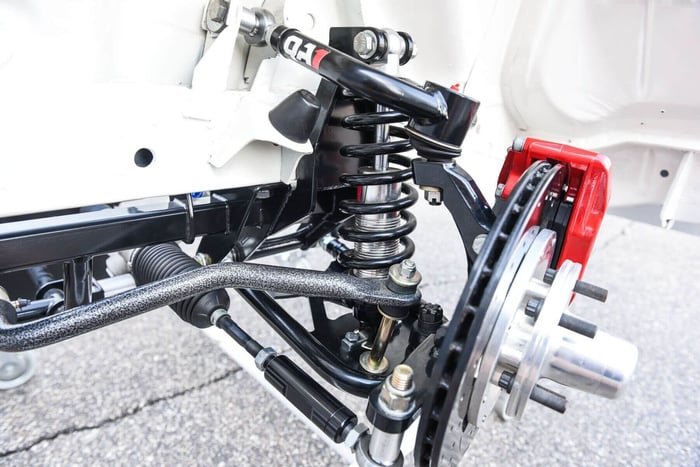Nothing ruins a good weekend trip faster than trailer problems. Whether it’s hauling a boat to the coast or heading out camping, everyone’s excited until those rough patches of road show up. Suddenly the whole load is bouncing around behind you, making everyone wonder if everything’s going to stay put back there. That’s the exact moment when good trailer suspension becomes really important.
Most people don’t think much about what’s underneath their trailer until something goes wrong. The truth is, trailer suspension makes a massive difference in how your trip goes, whether you’re hauling a boat to the lake or taking the family camping with a loaded trailer behind you.
What Makes Torsion Suspension Different
Traditional trailer setups usually rely on leaf springs, which have been around forever. They’re basically metal strips that flex when you hit bumps. They work, but they have their limits. Torsion suspension operates on a completely different principle that changes everything about how your trailer handles the road.
Instead of relying on springs, torsion systems use rubber cords or bars that twist when the wheel hits a bump. This twisting action absorbs the shock and then returns the wheel to its normal position. The whole system sits inside a sealed tube, which means weather and road grime can’t mess with the moving parts the way they can with exposed springs.
When you’re looking at upgrading your trailer setup, torsion axles for trailers offer some serious advantages that become obvious once you experience them firsthand. The sealed design means less maintenance headaches, and the way they handle bumps is noticeably smoother than what you get with leaf springs.
Highway Cruising Made Better
Long highway drives are where torsion suspension really shines. Everyone knows that feeling when you’re doing 100km/h on the freeway and your trailer starts getting a bit bouncy. With leaf springs, once that bouncing starts, it tends to keep going. The trailer develops what feels almost like a rhythm, bouncing up and down in a way that can get pretty nerve-wracking.
Torsion suspension cuts through this problem by damping out those oscillations much more effectively. Each wheel can move independently, so if one side hits a bump or pothole, it doesn’t affect the other wheel. This means your trailer tracks straighter and feels more stable at highway speeds.
The independent wheel movement also reduces tire wear. When both wheels are connected through a solid axle with leaf springs, hitting a bump on one side affects both tires. With torsion systems, each tire maintains better contact with the road surface, which means more even wear patterns and longer tire life.
Tackling the Rough Stuff
Australian roads can throw some serious challenges at you. One minute you’re on smooth asphalt, the next you’re dealing with gravel roads, speed bumps, or those sections where roadworks have left the surface pretty rough. This is where the difference between suspension systems becomes really obvious.
Torsion suspension handles these transitions much better than traditional setups. The independent wheel action means that when one wheel drops into a pothole or climbs over a rock, the other wheel isn’t affected. Your cargo stays more stable, and the whole trailer feels more controlled.
Off-road situations really highlight these advantages. Whether you’re backing a boat down a rough boat ramp or navigating a bumpy campground road, torsion suspension keeps things steady. The reduced shock transfer means less stress on your trailer frame and whatever you’re hauling.
Beach launches are a perfect example. Those access roads to boat ramps are often pretty rough, with deep sand, rocks, and steep grades. Traditional suspension can make these situations feel sketchy, especially with a heavy boat behind you. Torsion systems smooth out these challenges and give you more confidence in tricky situations.
Real-World Performance
The practical benefits of torsion suspension become clear pretty quickly when you start using it regularly. Maintenance is simpler because there are fewer exposed parts to worry about. No grease points to service, no spring bushings to replace, and no concerns about leaves cracking or sagging over time.
Load handling is another area where torsion systems excel. They maintain their ride height better under heavy loads, which means your trailer geometry stays more consistent. This translates to better handling and less strain on your tow vehicle.
The sealed design also means consistent performance in different weather conditions. Rain, mud, and salt don’t affect the suspension components the way they can with exposed springs and bushings. This reliability is especially important for people who use their trailers regularly or in challenging conditions.
What This Means for Your Next Trailer
So where does this leave you when it’s time to pick suspension? If you only use your trailer a few times a year on decent roads, the old leaf spring setup might do the job. But most people who get into regular towing quickly realize they want something better.
The thing about torsion suspension is that it costs more upfront, but you end up saving money later because there’s way less stuff to maintain and replace. When you add up fewer repairs and the fact that your cargo isn’t getting beaten up on every trip, the math starts working in your favor.
Once you experience how much smoother everything feels with torsion suspension, it’s hard to go back. Your boat doesn’t get rattled around, your camping gear stays organized, and those long drives to your favorite spots become less stressful. That’s worth something, especially when you’re trying to enjoy your weekends instead of worrying about your trailer.

